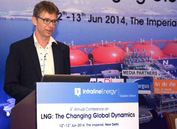Strengthening sustainable energy policy
Interview with Mr. Thomas Elmar Schuppe, Economist, CIM Integrated Expert on Energy, Observer Research Foundation, New Delhi

Mr Schuppe, you have been working with ORF for the last eight months in the area of energy policy. Please share with us what strikes you most about the energy sector in India.
In India, first and foremost there is a genuine need for energy, since roughly 300 million Indians still lack access to electricity and most of the remaining Indian population is facing numerous power outages, even in the cities. From a German (or European) perspective, we are used to taking strategic decisions which are initiated by politics or economics, for e.g. based on energy security or climate change. India’s energy sector is complex and quite distorted, especially against the backdrop that in Germany we are used to an energy framework based on more or less functioning markets.
What is the focus of your work at ORF?
ORF aims to strengthen the institutional knowledge, research output as well as consultancy efforts in the area of energy, work towards a reliable and sustainable energy policy in India and mitigate the country’s ecological footprint. Natural gas is widely seen as the transition fuel for the foreseeable future and might play a promising role in the Indian energy supply.
I have worked in the area of energy economic research as well as in the German gas industry. My research outputs are envisaged to contribute to stronger promotion of natural gas in India.
What have been your major achievements since you joined? Would you like to share with us any memorable experience which you had during your work until now?
Working in a new country comes with its own set of challenges, especially so in the case of India, given its size, diversity and the resulting complexity. In view of this, I would say that gaining insights into the Indian company structures and work culture has been an achievement. Also, I have been focusing on understanding the essential concepts, priorities and deficiencies of the Indian energy sector. Since I joined, I have produced valuable outputs for ORF in the form of publications and presentations at energy conferences in New Delhi, besides project work.
A memorable experience? The visit of Dr. Gerd Müller, German Federal Minister for Economic Cooperation and Development in February 2014 was one of the highlights of my first few months in India. I got an opportunity to briefly introduce my work during the discussion held at the German Embassy in New Delhi in which Minister Müller interacted with representatives of German development cooperation organisations and political foundations.
Where do you see synergies and possibilities of cooperation in the energy sector between ORF and Deutsche Gesellschaft für Internationale Zusammenarbeit (GIZ) GmbH, given that Integrated Experts placed by CIM work closely with GIZ in the host country?
There is a steady contact and exchange with the GIZ colleagues working in the energy sector, which sometimes offers chances for cooperation. For instance, GIZ supported the ‘Economic Policy Forum’ on ‘Resources Policy’, designed as a collaborative research platform which was hosted by ORF in New Delhi in February 2014.
Given the scope and nature of GIZ’s work, it has a strong interface with the government partners. A think tank like ORF interfaces with corporate houses, foundations, governments etc. in order to influence policy. I see these aspects concerning the partner structure as complementing each other. GIZ and ORF could benefit from each other’s outreach and partners in the sector.
You are in India along with your family. How have they been adjusting to life in India and in Delhi? Anything interesting you would like to share on this front?
My family arrived in Delhi in November last year – perhaps the best time to be in Delhi! Before they could get a real taste of the Delhi summer, they’re back in Europe for the summer-break. We live in a very central area of Delhi and appreciate the proximity to landmarks like the beautiful Lodhi Garden and Safdarjung’s Tomb. We are indeed impressed with the greenery in Delhi, despite the typical problems of a big city, which Delhi also faces.